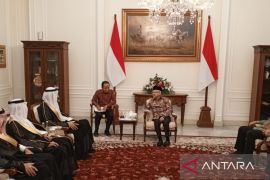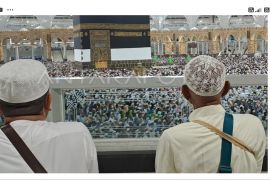Of the 50,000 over-stayers, the government is only planning to help some 25,000 return home this year for lack of funds while the remaining 25,000 will still have to stay there until they see what the government will do with them.
This year, the Indonesian government only has Rp128 billion in funds to repatriate some 25,000 over-stayers. Until last month, only 2,073 of the planned 25,000 have been facilitated to return home.
Yet, the government promises that it will do its best to bring home in stages its nationals who have overstayed their stay permits.
Head of the National Agency for Placement and Protection of Indonesian Workers (BNP2TKI) Moh Jumhur Hidyat said in written statement to a hearing with the House of Representatives (DPR) in Jakarta on Monday said that of the 50 thousand Indonesian nationals/migrant workers (WNI/TKIs), the Indonesian government had repatriated 2,073 in six batches since February 14, 2011.
In the near future, the government will again return 2,927 others using ship "Labobar" of the state-owned shipping firm PT Pelni, so that the plan of repatriating 5,000 TKIs in the first phase would immediately be realized.
For 2011, the BNP2TKI has not yet set any budget amount for the repatriation of the remaining 45,000 TKIs. "We need additional budget for the continuation of the repatriation," he said.
He said the relevant agencies needed to coordinate and gather funding based on the results of a meeting recently held at the office of the coordinating minister for people`s welfare.
For the repatriation of 5,000 TKIs for the first phase, the government has to spend Rp37.2 billion, of which Rp5.02 billion were owed to the national flag carrier Garuda Indonesia, Rp24.5 billion to Pelni and Rp7.8 billion to others.
Of the Rp7.8 billion, 2.5 billion came from the ministry of religious affairs, Rp400 million from the ministry of social affairs, Rp1.8 billion came from the BNP2TKI, Rp393 million from the ministry of health, Rp1.9 billion from police and Rp550 million from the office of the ministry of people`s welfare.
Jumhur predicted that the number of Indonesian migrant workers in Saudi Arabia reached 1.45 million with some 650 thousands staying in accredited areas of the Indonesian Consul General in Jedda, and Rp800 thousands in the accredited areas of the Indonesian Embassy in Riyadh.
He said that the overstayers were initially problematic workers who fled their employers` homes to various boarding facilities partly because they were not paid, treated inhumanely, had heavy workloads, worked not based on their contracts, had sexual harassment, had been abused, were not competent in work and faced cultural shock.
Besides, some overstayers are visitors who come to Saudi Arabia to perform a minor haj pilgrimage or umroh. There are umroh travel agencies which have not adopted a good management system so that pilgrims have the potentials to over-stay. This is due to the weaknesses of the system such as the lack of coordination between the Indonesian government and its Saudi counterpart.
After all, manpower suppliers and agencies overseas tend to have business orientation only so that they ignore protection and security aspects for workers. In addition, sanctions against manpower supplier firms (PPTKIS) which break the law, are still weak.
Even some PPTKIS do not provide enough guidance for employers and fail to provide data on TKIs arrivals for the Indonesian Embassy.
Therefore, the government will tighten its control on travel agencies organizing minor hajj pilgrimage (Umroh). Moreover, some 30 percent of overstayers who have been sent home turned out to have come from umroh travel agencies.
"Records on Indonesian migrant workers (TKI) who overstayed in Saudi Arabia and have been returned to Indonesia show that about 30 percent of them came from umroh pilgrimage groups," Manpower Minister Muhaimin Iskandar said in a hearing with the House of Representatives on Monday.
He said that the overstayers worked illegally after they performed religious rituals. "They want to perform rituals and work at the same time," he said. "Some others said they wanted to go home for free (waiting for repatriation) or wanted to follow their husbands who worked in Saudi Arabia," he added.
Based on the findings, the manpower ministry has asked the ministry of religious affairs to tighten its supervision on travel agencies organizing umroh pilgrimage.
The manpower ministry will also tighten its control over irresponsible manpower supplier firms that are found to have neglected their workers in Saudi Arabia.
"In order not to repeat this problem the manpower ministry and other relevant agencies will seriously tighten the mechanism in the sending of migrant workers, especially to the Middle East," the minister said. (*)
A014/HAJM/F001
Reporter: Andi Abdussalam
Editor: Jafar M Sidik
Copyright © ANTARA 2011











